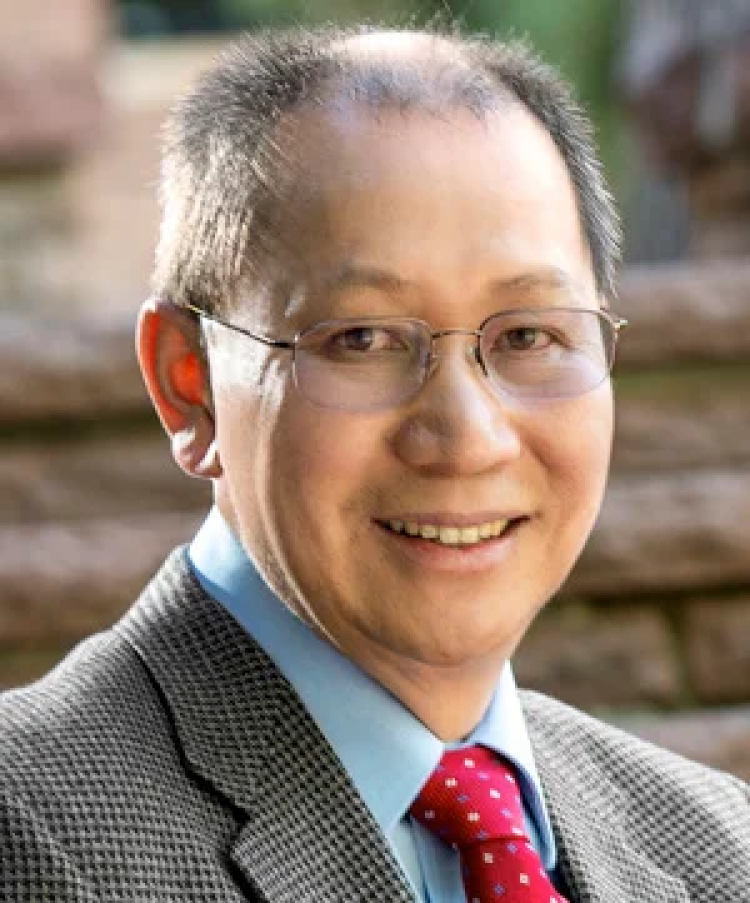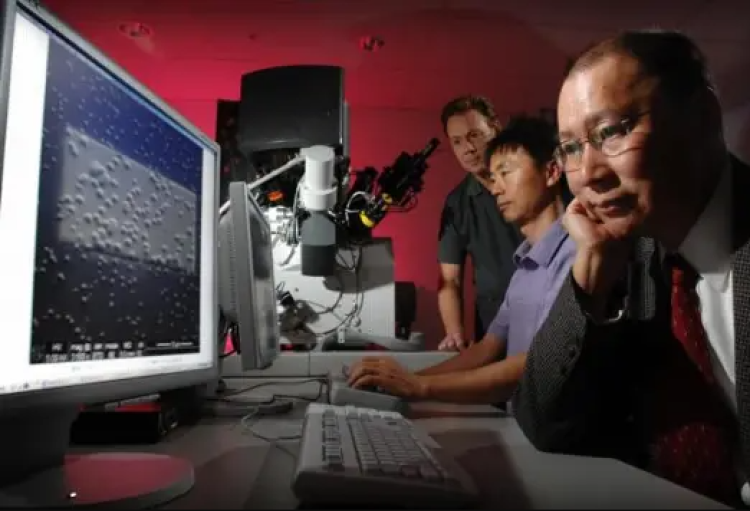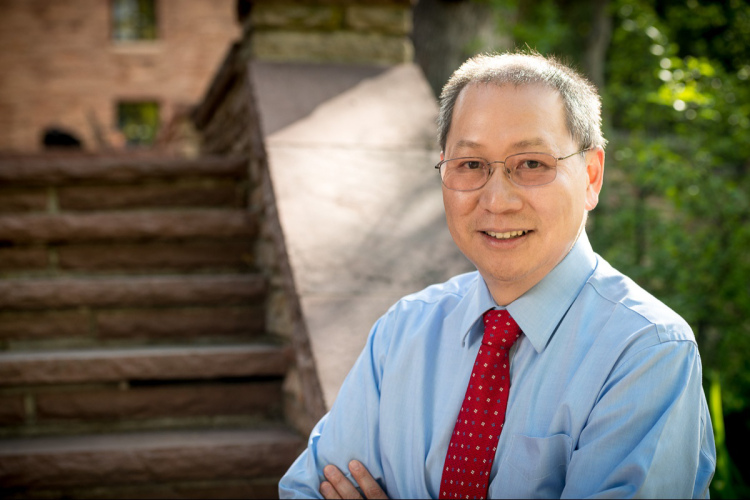Celebrating the career of retired CU Boulder Professor Emeritus Y.C. Lee

As the founder, president and CEO of Kelvin Thermal Technologies, Lee has pioneered the thinnest and most flexible cooling solution for smartphones, tablets, laptops, augmented reality, data center, electrical vehicles and micro satellites.
The success of the company can be attributed to the research Lee conducted while at the College of Engineering and Applied Science. Kelvin Thermal Technologies is a spinoff of Lee’s research in the Department of Mechanical Engineering, where he had been a professor for more than three decades.
“From a technology viewpoint, Professor Lee has made, and continues to make, tremendous strides in technology development for removing heat from embedded systems,” said Department of Mechanical Engineering Chair Michael Hannigan. “In other words, he helped make your cell phone work better.”
When Lee retired from the department in August 2021, colleagues voted for his professor emeritus designation, recognizing all his work and accomplishments as an expert in electronics packaging, director and founder of several research centers, and master collaborator with a commitment to supporting his colleagues.
Today, Lee looks back on his time in the Department of Mechanical Engineering with fondness.
“My own research, I truly benefit from the richness of the University of Colorado Boulder’s research community,” said Lee. “I worked and collaborated with faculty in mechanical engineering, electrical and computing engineering, chemistry, physics and molecular biology. My best memory was my interaction with so many different faculty members in different departments because of the nature of my research.”
From industry to academia
Lee joined the mechanical engineering department in 1989 after earning his PhD from the University of Minnesota and working in industry at AT&T Bell Laboratories.
“Bell Labs was the number one industrial R&D lab in the world,” said Lee. “That’s the place where scientists invented transistors, artificial neural network, and laser and optical fiber for long-distance communications. Bell Labs was the place that drove the entire information stage.”
Lee spent five years working for Bell Labs in electronics packaging – the interconnection of semiconductors in systems such as phones and computers – until his team’s work began outpacing what Bell Labs could afford. Lee had been researching multichip modules for semiconductors, but the cost for manufacturing them was too high and the project was terminated.
At the time, AT&T Denver Works had given the Department of Mechanical Engineering a major grant to help establish a research and teaching program in electronics packaging. It was a perfect fit with Lee’s experience and he was hired as an assistant professor.
Becoming an expert in electronics packaging

Lee quickly became a leader in electronic packaging after being awarded the NSF Presidential Young Investigator Award in 1990. His research was ahead of its time, focusing on very high-speed prototyping and manufacturing of multichip modules.
“Nowadays in the semiconductor industry, multichip modules are the solution,” said Lee. “Engineers can’t make a chip with a smaller and smaller transistor anymore in the near future; they need to interconnect several chips together. It’s a very hot topic now, but I was doing that in 1990.”
Lee also joined CU Boulder’s NSF Engineering Research Center for Optoelectronic Computing Systems. While the center was focused on electrical and computer engineering, Lee said the team was looking froward to having an electronics packaging expert.
“I was very excited, it was the first major center that I was a part of,” said Lee. “CU Boulder was recognized as a leader in optoelectronics, so suddenly I became a world expert in optoelectronics packaging. It was amazing!”
Lee eventually applied those expertise to projects with scientists at the National Institute of Standards and Technology in Boulder, further expanding his collaborations.
“I was happy to invite him in to our new thermoelectrics program a few years ago when we needed an expert in assembly and packaging,” said Dr. Kris Bertness, an Applied Physics Division group leader at NIST’s Physical Measurement Laboratory. “He has a knack for impressing program managers, understands a lot about tech-to-market and brings creative ideas to the effort. What I appreciate most is his positive attitude and direct communication style. He is a great person to have on your team.”
A leader in micro/nanoelectromechanical systems
In 1992, Lee played a critical role to support senior faculty as they founded a new research center – the NSF Center for Advanced Manufacturing and Packaging of Microwave, Optical and Digital Electronics (CAMPmode).
He served as the Associate Director of the center from 1993 to 2002. CAMPmode’s founding director was Lee’s longtime mentor, former Department of Mechanical Engineering Professor Roop Mahajan, who also served as the College of Engineering and Applied Science’s Interim Dean from 2001 to 2002.
“Y.C. Lee is among the best engineers I have met in life,” said Mahajan, who is now the Director and Chair in Engineering at Virginia Tech. “More importantly, he’s a wonderful human being and a great friend. He does not have a bad bone in his body.”
Throughout his career, Lee has been active in various professional societies including the American Society of Mechanical Engineers (ASME) Division of Electronics Packaging and Photonics. He was the chair of that division from 2004 to 2005.
ASME recognized Lee’s commitment by honoring him with the ASME InterPACK Achievement Award in 2013. Lee also served as the editor of the ASME Journal of Electronic Packaging with a support team of about 20 associate and guest editors from 2014 to 2020.
Lee then moved to what he described as the highlight of his career – founding and leading a multi-campus research center funded by DARPA and many industrial sponsors.
The DARPA Center on Nanoscale Science and Technology for Integrated Micro-Nano-Electromechanical Transducers (iMINT) was a partnership between CU Boulder, Columbia University, Northwestern University, UCLA, and UT-Austin.
Lee was the principal investigator and director of iMINT from 2006 through 2012. He said that center put CU Boulder on the map in micro and nanotechnology.
“The DARPA iMINT Center was also a great testbed that formed new collaborations between research groups and developed important infrastructure for research in materials science on the CU Boulder campus,” said Materials Science and Engineering Professor Steven George, a frequent collaborator. “The current Colorado Shared Instrumentation in Nanofabrication and Characterization had its origins in the initial equipment that Y.C. was able to install for the iMINT Center.”
Lee said he was also fortunate to receive funding for two DARPA projects while leading iMINT. One was to study micro cryogenic coolers and the second was in thermal ground plane research, which is the basis of his company Kelvin Thermal Technologies.
Department of Mechanical Engineering colleague Professor Victor Bright said that Lee’s favorite saying was ‘nothing is easy!’ Lee’s accolades prove that his perseverance won that matchup.
Supporting the ME community
Lee’s legacy in the Department of Mechanical Engineering spans farther than the groundbreaking research he conducted.
“From my view as department chair, Professor Lee had a huge influence in the current shape of the department,” said Hannigan. “He brought a positive and selfless attitude that has allowed us build a diverse and successful unit.”
He served as a department faculty search chair from 2015 until his retirement, helping the department grow into what it is today.
“I’m glad I made that contribution,” said Lee. “We hired quite a few young faculty members with great ideas. I’m proud to have been able to recruit some of them. You’re going to see their impact in research and teaching in the future.”

Lee also laid the groundwork for a teaching faculty member career ladder. In 2016, an ad hoc committee led by Lee developed a proposal that would allow teaching faculty to get the promotions they deserve.
While the proposal was approved by the mechanical engineering department, it ultimately did not pass campus approval. However, the university implemented a similar system a few years later.
“Our teaching faculty members, they deserve it,” said Lee. “I appreciate their contribution. They deserve their career ladder and to be well recognized.”
Various instructional faculty in the Department of Mechanical Engineering have shared their gratitude and reverence for Lee’s work. It has benefited each of them greatly and will continue to guide the department in the future.
“Y.C. is thoughtful and strategic, not only about his own work but also about the department’s direction and his colleagues,” said Associate Teaching Professor Julie Steinbrenner. “He worked hard to create career paths for instructional faculty, even though he had no personal benefit or requirement to do so. He advocated for the department to pursue big initiatives and cutting-edge research areas. Every time Y.C. voiced an idea in a meeting, I listened because I could count on it being insightful and impactful.”
Lee said that while he does miss teaching and interacting with students, he’s now able to support them in a different way – by hiring them. Kelvin Thermal Technologies has five mechanical engineers that all graduated with degrees from CU Boulder’s Department of Mechanical Engineering.
“I do appreciate the strong department because as a local company, I benefit from it,” said Lee. “I get to hire these students and they deliver; they are truly outstanding. We are a world leader in this cooling solution because of our students. They always surprise me. I ask them to do something and they come back with something well beyond my imagination. We should be proud of our students.”

